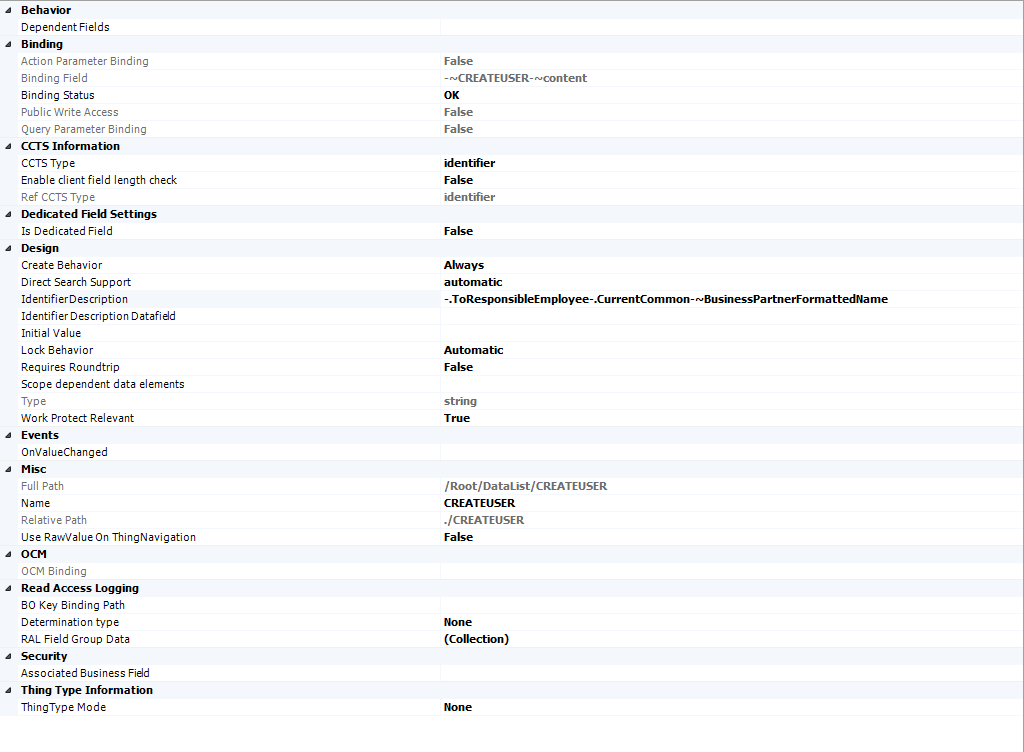- SAP Community
- Products and Technology
- Technology
- Technology Q&A
- Create a DefaultSet to Show only MyInstances
- Subscribe to RSS Feed
- Mark Question as New
- Mark Question as Read
- Bookmark
- Subscribe
- Printer Friendly Page
- Report Inappropriate Content
Create a DefaultSet to Show only MyInstances
- Subscribe to RSS Feed
- Mark Question as New
- Mark Question as Read
- Bookmark
- Subscribe
- Printer Friendly Page
- Report Inappropriate Content
on 11-16-2016 3:32 PM
Hi expersts,
is there a guide or correct explanation on how to create a DefaultSet for the OWL which will select only the instances which are created by myself?
I know that standard screens preovide it and i tried to look up some mechanics with field transformations etc but I did not behind how it's working.
It is a high prio topic for me so a fast solution would be awesome.
This is the field where the creation user is safed. Field Type: EmployeeID

Kind Regards,
Johannes
- SAP Managed Tags:
- SAP Cloud Applications Studio
Accepted Solutions (1)
Accepted Solutions (1)
- Mark as New
- Bookmark
- Subscribe
- Subscribe to RSS Feed
- Report Inappropriate Content
You must be a registered user to add a comment. If you've already registered, sign in. Otherwise, register and sign in.
- Mark as New
- Bookmark
- Subscribe
- Subscribe to RSS Feed
- Report Inappropriate Content
Hi Fred,
I pretty much understand what the blog is doing but my requirement looks a little bit different and i am currently not able to manage it.

This is my OWL, now I want to have a filter for "My Votings" which filters the field "Anzeigefeld Mitarbeiter".
The code for "BevoreSafe" of the Object looks like this.
if(accountteamtable.GetFirst().IsSet())
{
foreach(var responsible in accountteamtable)
{
var salesorganization = responsible.SalesOrganisationV1.CurrentNameAndAddress;
if(responsible.PartyRoleCode == "***" && salesorganization.Name =="***")
{
var employee = BusinessObject::Employee.Retrieve(responsible.EmployeeUUID);
this.ToActualModifyer = employee;
this.For_Access_Control = employee;
this.Consistent = "3";
this.CV_EDITOR_MA.content = this.For_Access_Control.IdentificationEmployeeID.EmployeeID.content;
}
else
{
this.Consistent = "2";
}
}
}
I bound the OWL query to the created overview query from the blog. The RBAM datas are also correct but i still see all created objects. My goal is, that only the user with the ID 2163 can see the Instances with "Anzeigefeld Mitarbeiter" - ID 2163. The Datatype of "Anzeigefeld Mitarbeiter" is EmployeeID. On "All Votings", of course all votings should be visible. Could you help me to achieve this?
Kind Regards,
Johannes
- Mark as New
- Bookmark
- Subscribe
- Subscribe to RSS Feed
- Report Inappropriate Content
- Mark as New
- Bookmark
- Subscribe
- Subscribe to RSS Feed
- Report Inappropriate Content
Hi Fred,
after testing I came to the conclusion that this is not what i needed.
I dont want restrictions for my Instances yet I need filter for "Anzeigefeld Mitarbeiter" which filters out all Instances with the same ID as the current logged in User.
I hope this helps to understand my needs.
Could you give further advises ?
Kind Regards,
Johannes
- Mark as New
- Bookmark
- Subscribe
- Subscribe to RSS Feed
- Report Inappropriate Content
Hi Johannes,
Your requirement is much more simple.
Just add your user UUID to your business object definition.
e.g
element VotingID: ID;
element Anzeigefeld Mitarbeiter: EmployeeID;
element UserUUID: UUID;
In before-safe event, assign the UserUUID with the login user.
this.UserUUID = Context.GetCurrentIdentityUUID(); // this is a system reuse function
In the OWL, create a search parameter for UserUUID and bind the search parameter with a field transformation to get the current user UUID.
Check here about Field Transformation.
Best Regards,
Fred
- Mark as New
- Bookmark
- Subscribe
- Subscribe to RSS Feed
- Report Inappropriate Content
Hi Fred,
thank you a lot 🙂
I made it even easier through the guide. I created my own reuse library which returns the current user employee ID and used it on the UI as field tranfsormation as searchparameter for my defaultset (I couldnt find the right reuse library from sap standard and I am to lazy to look up every library).
It finally works! Thanks 🙂
Kind Regards,
Johannes
Answers (0)
- Adding a second standard layout in Variant Management in Technology Blogs by Members
- Create different views in the Custom Solution. in Technology Blogs by Members
- How to create an Advanced Search Filter in Custom OWL screen using SADL query. in Technology Blogs by Members
- Configure OVS for intellisense in Technology Blogs by Members
| User | Count |
|---|---|
| 85 | |
| 10 | |
| 10 | |
| 10 | |
| 7 | |
| 6 | |
| 6 | |
| 5 | |
| 4 | |
| 4 |
You must be a registered user to add a comment. If you've already registered, sign in. Otherwise, register and sign in.